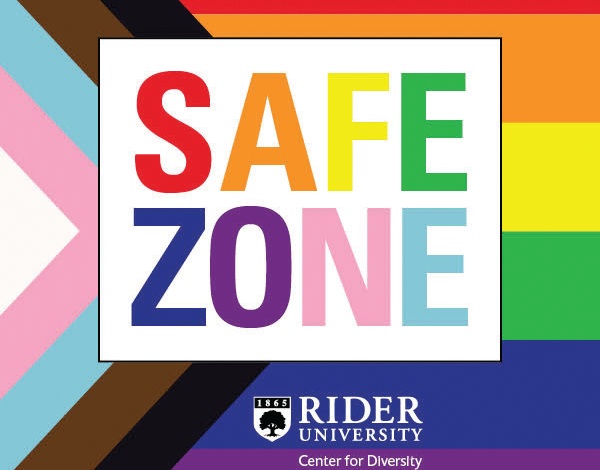
SafeZone trainings educate allies
By Jay Roberson
THE Center for Diversity and Inclusion (CDI) aims to cultivate a welcoming and inclusive environment for every Rider student regardless of their identity. One of the ways they do this is by hosting SafeZone trainings through “The Rider Allies Safezone Program” every two years. The first training for the 2023-25 certification took place in the CDI on April 21.
Learning specialist at the Academic Success Center (ASC) Martha Higginbotham, an attendee, explained that these trainings can help educate more faculty and students by ensuring a more caring community.
“I hope [SafeZone trainings] start to change people’s way of thinking. And people become more open to everyone we meet … Not determine it by their sexual orientation or anything else. It’s really important as a world and as a community to be loving and kind,” said Higginbotham.
Attendees began by introducing themselves with their pronouns, which are an important part of many LGBTQ+ members’ identities. Assistant director of the CDI Shaun Williams led the training, and his first point emphasized the importance of always asking for, rather than assuming, someone’s pronouns
“I learned today, in Spectrum [the club] and even in our training, [gender and sexuality]’s all fluid, it’s ever-evolving and there’s something new to be learned each time,” said Williams. “I think it’s very important that we learn new things and we really take the time to educate ourselves because it’s not just important for us to know, but it’s important that we’re honoring inclusivity and we’re protecting and honoring the LGBTQ+ community.”
Williams had participants discuss different parts of their identity using a social identity wheel. He began to speak about the many different identities people have and how each of them are separate, which was a segway into the discussion of the difference between sexuality and gender identity.
Audra Lubiak, associate director of alumni relations and SafeZone trainer, stated that everyone has unique identities, and people have to be more open to hearing about all identities.
“We all come from different cultures and areas, just ways of life and we all have to live together. People should be mindful of where people are coming from and to be open to listening to their side, as well as them listening to your side,” Lubiak said.
The next portion of the SafeZone training consisted of learning about LGBTQ+ history. Though there has been much progress regarding the rights of LGBTQ+ people, Williams noted they still face obstacles today.
“I hope that moving forward as we have more trainers that people will begin to open their eyes, that the community of people here just embraces our LGBTQ+ community, and that more people might feel safe enough to come out and that our LGBTQ+ community grows,” Williams said.
Another section of the training involved the discussion of only some of the many different gender identities and sexualities in the LGBTQ+ community. Along with this, Williams spoke about the power of language and what words to use or not use to avoid being offensive or non inclusive.
“It’s important for us to continue to grow and constantly learn in order for us to be the best people we can be and support the students we serve,” said Higginbotham.
Williams provided trainees with different ways they can be allies to the LGBTQ+ community to conclude the session. This included using inclusive language, acknowledging biases and privileges along with understanding current LGBTQ+ issues.
“I’m 73 years old, I just got my doctorate, and I think learning is forever. So because I was asked to teach a course in September, I thought it was really important for me to get as current as I could,” Higginbotham said.
The SafeZone trainings ensure that both students and faculty are educated and aware of the identities of LGBTQ+ members at Rider as well as how to respect their identity. Once certified as an ally, attendees received a sticker to display which shows their allyship and support of the LGBTQ+ community and that they have gone through SafeZone training. More sessions will be held in Fall 2023 to give more students and faculty the chance to receive a SafeZone certification.


